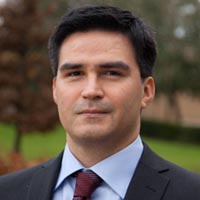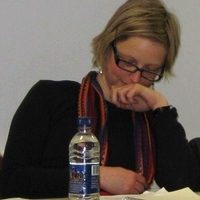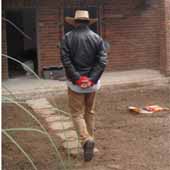Dr Javier Caletrío – Research Fellow at the Centre for Mobilities Research
Javier Caletrío’s research is in the spirit of Burawoy’s public sociology and aims to contribute to policy debates about the construction of common political, cultural and environmental spaces in the Mediterranean and the Caribbean. A first strand of his current work builds on previous research on tourism mobilities and environmental change and focuses on the role of global risks in creating shared horizons of expectation. Recent work in this area has focused on how climate change is shaping tourists’ experiences of place. He participates in the project ‘Tourism, Territory and New Mobilities: a comparative perspective Mexico – Spain’ involving Madrid’s Universidad Complutense and the Centro Peninsular en Ciencias Sociales y Humanidades, Universidad Nacional Autónoma de México – Mérida.
A second interrelated strand of his research engages with debates about multiple modernities in Latin America and the Mediterranean and seeks to elucidate the role of physical movement in underpinning processes of regional de/stabilization. He is particularly interested in the role of mobility in the dialectics of peace and conflict in the checkered history of Caribbean and Mediterranean societies. Both strands of research are part of a long term project on mobility, cosmopolitanism and sustainability. View profile
Dr Allan Discua Cruz
 Allan Discua Cruz, PhD (Lancaster) is a Lecturer in Entrepreneurship at the Department of Entrepreneurship, Strategy and Innovation (DESI) in the Lancaster University Management School. He is a founding member of the Centre for Family Business at DESI. He is a member of a family in business and his professional background is on industrial analysis and manufacturing management. He has published in entrepreneurship and family business related journals such as Entrepreneurship and Regional Development, Entrepreneurship Theory and Practice, Journal of Family Business Strategy, Business History, Faith in Business Quarterly, as well as book compilations. His current research focuses on entrepreneurial dynamics by families in business and social contexts of entrepreneurship.
Allan Discua Cruz, PhD (Lancaster) is a Lecturer in Entrepreneurship at the Department of Entrepreneurship, Strategy and Innovation (DESI) in the Lancaster University Management School. He is a founding member of the Centre for Family Business at DESI. He is a member of a family in business and his professional background is on industrial analysis and manufacturing management. He has published in entrepreneurship and family business related journals such as Entrepreneurship and Regional Development, Entrepreneurship Theory and Practice, Journal of Family Business Strategy, Business History, Faith in Business Quarterly, as well as book compilations. His current research focuses on entrepreneurial dynamics by families in business and social contexts of entrepreneurship.
He recently completed two book chapters around the issues of state intervention and immigration in the development of family businesses in Honduras. Taking into account historical records and the accounts of members of existing families in business he led a group of Honduran scholars to provide a vivid illustration of the relevance of incorporating the views of families in business in Latin America to our understanding of how businesses survive through several political interventions.
He recently received the Most Inspirational Award in the SIG on family businesses at EURAM 2016. This co-authored work focused on the challenges that coffee producing families have in Guatemala. The findings of this work highlight the relevance of traditional knowledge in coffee production, professionalization of subsequent family generations and the approach to develop several network alliances for specialised coffee in developing Latin American countries.
He has recently attended invitations as a visiting professor in Honduras at the Universidad Tecnologica Centroamericana (UNITEC) and in Peru at the Escuela de Administracion de Negocios (ESAN).
View Profile
Cornelia Gräbner

Cornelia Gräbner works on the relationship between literature and imaginaries of resistance. She is interested in the ways in which writing, poetry and storytelling reinforce subjectivities of resistance under politically oppressive conditions, especially under the state of exception, and in the ways in which they can contribute to the construction of alternative social and political models. Her most recent research is on the city as a location for contestatory imaginaries of citizenship and political and creative agency, and on social movements in Mexico. Currently she is writing on the representation of 1970s guerrilla movements in Mexico in contemporary novels, and on intertextuality and the construction of a global imaginary of resistance in the works of Eduardo Galeano, José Saramago, and the Subcomandante Marcos. A focal point for Cornelia’s research is the network Poetics of Resistance. The network is made up of scholars, activists and cultural producer from Latin America, Europe and the U.S., and explores the ways in which cultural production and knowledge production can productively participate in the resistance to neoliberal politics. View profile
Dr Julie Hearn – Lecturer in Politics and International Relations
Julie Hearn teaches the politics of development at undergraduate and postgraduate level. In 2002/03 she spent ten months in Argentina researching the unemployed workers and occupied workplace movements. She returned in 2007 to teach at a summer school at the University of Buenos Aires. In 2008 she received a British Academy Small Grant with Monica Bergos to research trade union activism among low paid Latin American migrants in London. She is interested in the relationship between British trade unions and migrant workers and immigration policy, especially current debates around regularization. View profile
Dr Amalendu Misra – Senior Lecturer, Department of Politics & International Relations
 Amalendu MISRA studies the narrative of violence in contemporary Latin American politics. His area focus is Central America and Mexico. Over the past decade he has collaborated with various governmental and non-governmental bodies on grassroots peace-building in the region. He recently concluded a British Academy funded project on Mara Salvatrucha.
Amalendu MISRA studies the narrative of violence in contemporary Latin American politics. His area focus is Central America and Mexico. Over the past decade he has collaborated with various governmental and non-governmental bodies on grassroots peace-building in the region. He recently concluded a British Academy funded project on Mara Salvatrucha.
Amalendu has taught in Universidad de Las Americas, Puebla & El Colegio de Veracruz, Xalapa. In addition, he is a dedicated planter and grows his own brand of coffea arabica in the eastern Mexican highlands. View profile
Dr Amit Thakkar – Lecturer in Latin American Studies
Amit Thakkar researches Latin American film, literature and history. He began his career investigating the relationship between irony, postcolonialism and revolution in the fiction of Juan Rulfo. He has published two articles on this subject. He has also produced the first study of the relationship between Rulfo’s fiction and his thought on indigenous peoples in Mexico. His book, The Fiction of Juan Rulfo: Irony, Revolution and Postcolonialismis currently under review.
Amit is currently engaged in a research partnership with Chris Harris (Liverpool) on masculinities and violence in Latin American cultures. Thakkar and Harris have won external funding to hold a workshop on this subject in Lancaster in December 2010 (from JISLAC, the Joint Initiative for the Study of Latin America and the Carribean). Amit and Chris published a special edition of the prestigious Bulletin of Hispanic Studies (Liverpool) on masculinities in Latin America in September 2010. The contributions, from a range of scholars, include topics such as military masculinities in 19th centuryColombia, protest masculinity in1970s El Salvador, war masculinities during the Mexican Revolution and the relationship between text ownership and masculinity in the works of the Mexican Onda (1960s). Amit’s own contribution to this publication is an article on revolutionary masculinities and structural violence in 1960s Cubain Tomás Gutiérrez Alea’s Memorias del subdesarrollo (1968).
Amit’s current projects are varied. He is working on an original theory on the ‘crash aesthetic’ in Spanish-language cinema, particularly Amores perros (2000) and Abre los ojos (1997). He is also preparing an article on the relationships between masculinities and conquest in La otra conquista (1998).Finally, in a reversal of historically-contextualised cultural studies, he isalso working, with Matthew Brown (Bristol),on a historical study with a cultural context: the participation of slaves in resistance to the British invasion of Buenos Aires, 1806-07. View profile
Dr Paul Oldham
